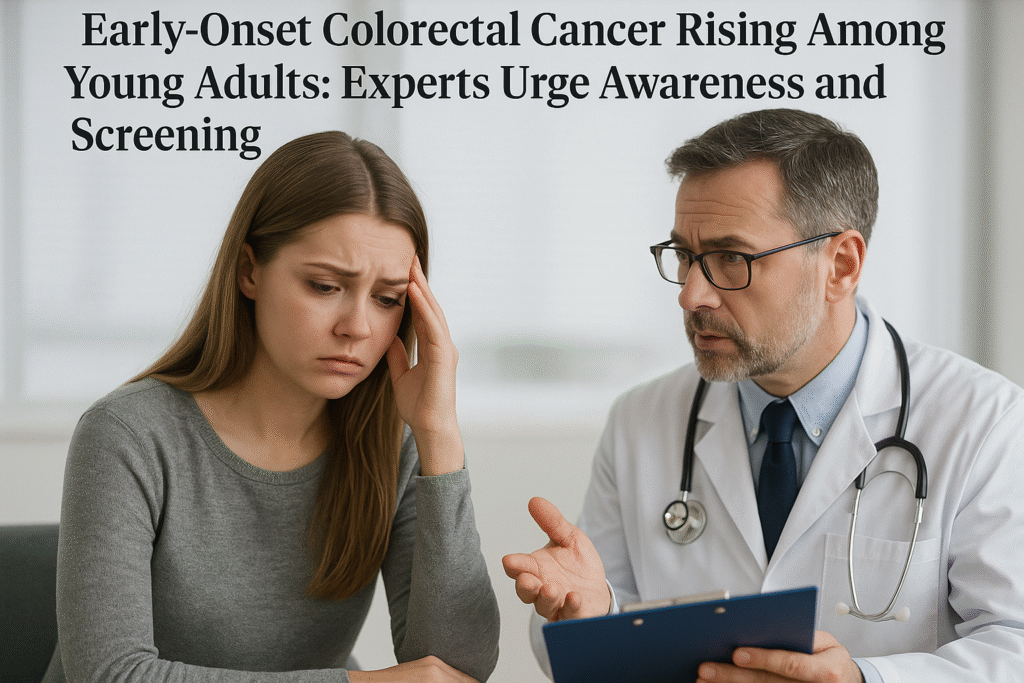By Harshit, Washington, D.C., October 20, 2025
Hearing a cancer diagnosis is devastating at any age, but for younger adults under 50, it can be especially jarring. Early-onset cancer, defined as disease occurring before age 50, is increasingly common, with colorectal cancer standing out among the fastest-growing types, according to leading oncologists.
Dr. Kimmie Ng, a gastrointestinal oncologist and associate professor of medicine at Harvard Medical School, highlighted the troubling trend in a recent discussion on CNN’s podcast, Chasing Life. Ng, who has treated patients for two decades at Boston’s Dana-Farber Cancer Institute, is also the founding director of the Young-Onset Colorectal Cancer Center, one of the first U.S. centers focused on younger adults with colorectal cancer.
“It was shocking to see young, healthy individuals with no family history being diagnosed with Stage 4 disease. And over time, it has become more common,” Ng told Dr. Sanjay Gupta.
The incidence of colon and rectal cancer in young adults has been rising by approximately 2% per year since the mid-1990s, affecting both men and women globally. Young adults diagnosed with colorectal cancer face unique challenges, balancing careers, child-rearing, and caregiving responsibilities for aging parents, all while managing a life-threatening disease.
Early-onset colorectal cancer is already the leading cause of cancer-related death in men under 50 in the U.S. By 2030, it is projected to become the leading cause of cancer deaths among women under 50, surpassing breast cancer, Ng said.
Screening Remains Crucial
While overall colorectal cancer cases and deaths in the U.S. have declined over decades due to improved treatment and screening, these benefits have not extended to younger populations. In 2021, the U.S. Preventive Services Task Force lowered the recommended starting age for colorectal cancer screening from 50 to 45 for average-risk adults.
Ng emphasized that rather than lowering the screening age further for everyone, efforts should focus on identifying high-risk younger adults and ensuring more people undergo recommended screenings. “Screening can be lifesaving. Public health efforts to increase participation remain critical,” she said.
Recognizing Early Symptoms
Awareness of early warning signs is essential. Blood in the stool, particularly when mixed into the stool rather than appearing on top or on toilet paper, is a red flag. Unexplained weight loss, prolonged changes in bowel habits, thinner stools, abdominal pain, and fatigue may also indicate colorectal cancer. Prompt discussion with a healthcare provider is crucial for early detection.
Alt text: Young adult examining stool sample, symbolizing early detection of colorectal cancer
Environmental Factors and Lifestyle
Ng noted that rising rates of early-onset colorectal cancer appear generational, with each generation born after 1950 experiencing higher incidence. Environmental factors, rather than genetics, are thought to be driving this increase. Obesity, sedentary lifestyles, diets high in red meat, processed foods, and sugary beverages are likely contributors.
However, Ng emphasized that not all younger patients fit this profile. Many diagnosed are healthy, active individuals with balanced diets, suggesting other environmental exposures, such as microplastics or early-life dietary influences on the gut microbiome, may also play a role.
Genetic Insights
Although most early-onset colorectal cancers are not hereditary, young patients are more likely to have genetic syndromes like Lynch syndrome or familial adenomatous polyposis. Ng recommends that all young patients diagnosed with cancer undergo genetic testing and understand their family history to inform screening strategies.
Young Patients’ Advantages
Younger cancer patients often have better tolerance for aggressive treatments, including higher chemotherapy doses, surgery, and radiation, compared with older adults. “While the diagnosis is daunting, younger patients have certain advantages that can improve outcomes,” Ng noted.
Key Takeaways
- Colorectal cancer incidence is rising in adults under 50.
- Early detection through screening and awareness of symptoms is critical.
- Environmental and lifestyle factors likely contribute, though many young patients are otherwise healthy.
- Genetic testing can identify high-risk individuals and guide preventive care.
- Younger patients may tolerate aggressive treatments better, offering a potential advantage in outcomes.
Public health initiatives to promote awareness, encourage screening, and study environmental and genetic contributors are crucial as early-onset colorectal cancer becomes an increasing concern.

